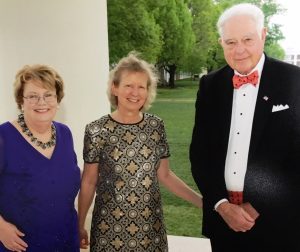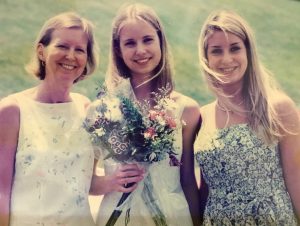This June, Dr. Diane Snustad retired as the Claude Moore Associate Professor of Medicine in DOM’s Division of General, Geriatric, Palliative and Hospital Medicine, and was awarded emeritus status by the UVA Board of Visitors. A University faculty member for 31 years, Dr. Snustad served as medical director for The Colonnades since its opening in 1991. She has made perennial appearances on the top doctor lists (Castle Connelly, Best Doctors in America), and was featured, along with two other UVA faculty members, in a National Library of Medicine traveling exhibit, “Changing the Face of Medicine.”
Below, Dr. Snustad shares some personal history and professional wisdom gleaned over a long and distinguished career. Congratulations on your retirement, Dr. Snustad!
I grew up in northwestern Minnesota in a town of about 500 people, mostly Norwegian Lutherans. Not quite Lake Wobegon, but just down the road from there. My father was an electrical engineer, and my mother a classic 1950s homemaker.
I have three brothers who, despite my predictions while we were growing up, have turned into wonderful people. I probably was most influenced by my somewhat iconoclastic older brothers and my renegade aunt, who became the closest thing our family had to a black sheep when she left the fold and moved to California to marry a wine-taster. (Her father was a part-time tent revival fire-and-brimstone preacher, and was not amused.)
Why medicine? Why geriatric medicine?
I have to admit that I did not set out with the intent to do either. But maybe it was the appeal of rooting for the underdog that got me interested in geriatric medicine. Then I discovered that I really liked older patients, and that I enjoyed the complexity and the detective work involved in caring for them. And my colleagues and co-workers in geriatrics are generally kind and good people, who are there for what seem like the right reasons.
Looking back on your career at UVA and as a geriatrician, what are one or two accomplishments you are most proud of?
I think I am most proud of my relationships with my patients. I believe they know that I care about them, and I hope I have modeled that for medical students and residents.
I am also proud of the Colonnades Medical Associates Clinic, which has grown over the last (almost) 26 years from the original schedule of two hours, twice weekly, to a full-time, five-days-a-week practice. The clinic name turned out to be a bit optimistic, however, as there have been only brief periods of time when “Associates,” plural, has been accurate. Mary Preston, Andy Wolf, and then Angela Stiltner (now medical director at Hospice of the Piedmont) have allowed the name to make sense for at least part of the clinic’s existence.
Words of advice for the next generation of geriatricians, and/or for those practicing internal medicine?
Remember Hickam’s Dictum, that you can’t get old quickly, and that the medications are guilty until proven innocent.
Proudest achievement outside the professional realm?
I don’t know if this counts as outside the professional realm, but it is outside my job description. I have been working with Ashley Cullop of the development office to establish an endowment for geriatric education. The interest from the endowment will be available for educational or research projects related to older people and their care; it can also be used to support people interested in working with older patients, including fellows, residents and students. So far, we have raised over $373,000.
After retirement from UVA, what’s your next chapter?
Sleep first! Then the traditional retirement (I prefer the term “extreme vacation”) pursuits: travel, more time with family and friends, working with students at the Free Clinic, maybe finishing a book I started to write long ago. (Working title: “Grandma Got Old Last Week.”) And deciding what I want to do when I grow up.
Who or what inspires you?
Many of my patients are members of “The Greatest Generation.” They are such quietly courageous, strong and capable, kind and decent people. They seem to be able to deal with whatever hardships or difficulties arise without drama or self-pity.
The average age of my clinic patients is 86, so most of them have rather complicated medical histories and impressive lists of ailments, keeping any number of doctors in business. Despite that, they remain active, interesting, gracious, and generous people. And almost all of them have accumulated a share of the fabled wisdom that is supposed to come with age.
I just hope that I can do this aging thing that I have been studying for the last 30 years half as well as my patients.
What about you would surprise us?
I established the Department of Medicine’s maternity leave policy, as I was the first person to need it (in June 1987).
I’m just sorry that I didn’t ask for it to last twice as long!

Diane, center, with UVA President Terry Sullivan (left) and former Rector of the UVA Board of Visitors, William Goodwin, right, at a dinner for retiring UVA faculty members.

Diane, with her daughters Emily (center) and Allie (right), at Emily’s high school graduation 10 years ago. Allie is now an attorney practicing in Staunton and Harrisonburg, and Emily is a solar engineer in Berkeley, CA.
Serving Her Community
In 2012, Diane was named to the Daily Progress annual “Distinguished Dozen” list, which honors those who, “often through quiet efforts, make a difference in the lives of Central Virginians.” She was recognized for her work as The Colonnades’ medical director, and for her volunteer efforts at the Charlottesville Free Clinic.
In a 2012 Medicine Matters article about the rewards of volunteering, she shared her reasons for volunteering at the CFC:
- Because I can give something which costs me nothing, but is worth a tremendous amount to the people who receive it.
- Because I leave the clinic feeling like I was the one who received the gift.
- Because I have the pleasure of working beside like-minded and like-spirited people.
- Because no one is thinking of productivity or performance targets.
- Because these clinics are an inadequate, but admirable, attempt to make up for the incomprehensible choices of our society, which refuses to provide for the most basic needs of its citizens.
- Because I could have been in the same position as the people who are served by these clinics.
Filed Under: News and Notes
